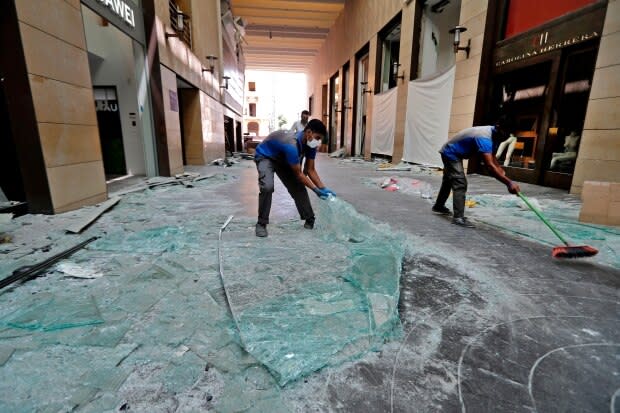Now in N.L., a former Beirut resident reflects on family, friends caught in massive explosion
A St. John's restaurant owner has been closely watching events unfold in her former home of Lebanon since a warehouse explosion ripped through the city Tuesday, killing at least 135 people and injuring thousands more.
Judy Yassine, co-owner of Resto Beirut, says the tragedy has been difficult to see.
"There's no word that would ever express how we are feeling. It's very sad. We couldn't sleep all night," Yassine told CBC Radio's St. John's Morning Show.
"Thinking about our loved ones and friends there, families, everyone — it was really hard for us to see it on social media."
Yassine and her husband left Lebanon in 2015 to escape escalating violence in Beirut. They landed in Arizona before moving to Newfoundland and Labrador in 2016.
She said her immediate reaction was to try to reach family — her aunt and her aunt's husband — still living in the city.
"We were really worried. At first we couldn't get ahold of them because everything was shut down. The electric company did get destroyed from the explosion, as well as the internet company, too," she said.
"It was hard for us to contact them, but then, thank God, we did [get to] talk to them and they're OK."
'It was raining glass'
Yassine said her aunt and her aunt's husband have experienced war and violence before, but nothing like Tuesday's catastrophe.
The couple were on a motorcycle not far from the warehouse when it blew — around 6 p.m. during the busiest part of the day in one of the busiest areas of the city, Yassine said.

"She was crying, and her husband also because all of a sudden it was raining glass from everywhere," said Yassine.
"Plus they were on a motorcycle so there was nothing that could protect them. They have minor injuries, but they're not really severe … but they were in shock."
Support
Yassine said Tuesday's explosion adds to the growing list of difficulties Lebanon was already facing.
She said the country was staring down political and economic crises — on top of the global COVID-19 pandemic — and now some 300,000 people in Beirut are left homeless.
"Some people are living on the street. It's really hard. The Lebanese currency deteriorated, so it's harder for them now to fix their houses. Lot's of people now, they don't have shelters. Especially the people who lived really close to the explosion," she said.
"They didn't really need this over everything that's happening. The pandemic, the crisis that they are passing through, they didn't need this."
Read more from CBC Newfoundland and Labrador

